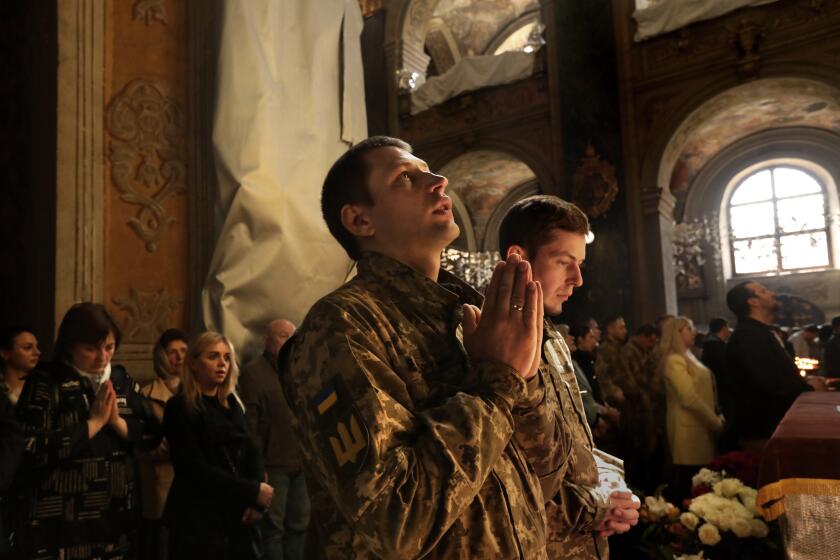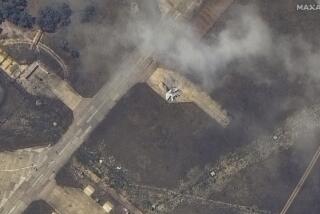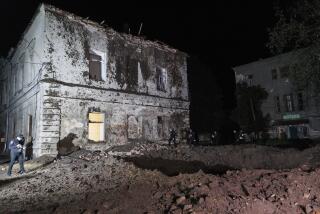EU weighs ban on Russian oil as missiles hit west and east Ukraine
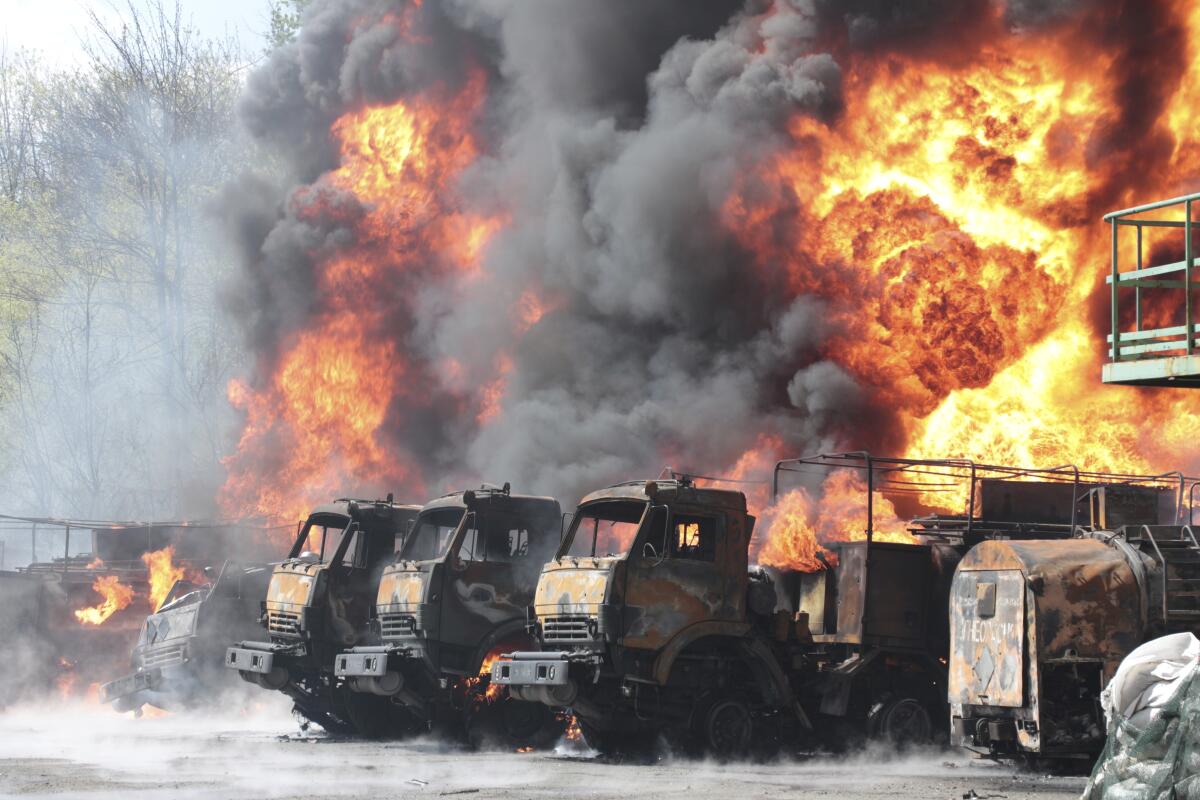
- Share via
KYIV, Ukraine — The European Union proposed a ban on Russian oil Wednesday as Moscow’s forces took concerted aim at Ukraine’s infrastructure and Western arms shipments to the embattled nation.
The proposal, which marked the EU’s biggest step yet to wean itself off Russian fossil fuels, came as the Kremlin’s forces hammered eastern and central Ukraine overnight and targeted several railway stations. Russian forces also struck the west in an attempt to disrupt the flow of Western aid.
The EU’s executive arm put forward a plan for a boycott of Russian oil in an attempt to sever a major source of revenue for the Kremlin’s war machine, having already announced a ban on Russian coal.
But halting oil imports is a process that would take months to complete as the 27-nation EU tries to secure alternative supplies of energy. The ban could have holes in the form of exemptions for members Slovakia and Hungary, which say they are too dependent on Russian oil to support a complete cutoff.
And the proposed ban does not include Russian gas, which the EU buys in greater quantities than oil and relies on more heavily for heating, cooking and industry. Germany, Europe’s largest economy, and other major EU countries have balked at cutting off Russian gas.
Still, sanctions on Russian oil could significantly hamper Moscow’s ability to diversify its economy and modernize. The EU, Russia’s biggest customer for fossil fuels, is estimated to have paid more than $55 billion for Russian oil, gas and coal since Ukraine was invaded Feb. 24, according to the Helsinki-based Center for Research on Energy and Clean Air.
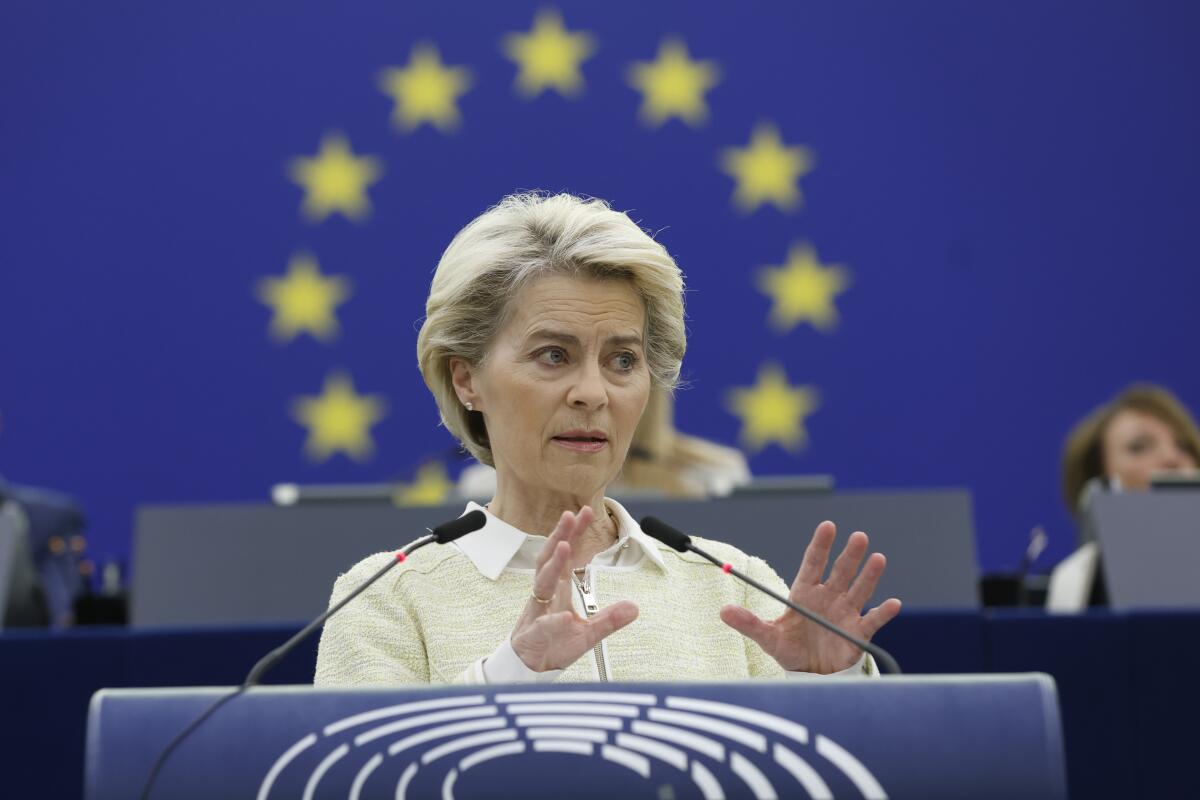
The oil embargo would almost certainly raise prices and inflict pain on consumers in the EU. The proposal is likely to be subject to a fierce debate among EU leaders before they decide whether to adopt it.
Ukrainian Foreign Minister Dmytro Kuleba welcomed the proposal. In a video message posted Wednesday on Twitter, he said Ukraine is not happy that the ban would be delayed for several months, but “it’s better than nothing.”
“As long as Russia continues to receive revenues in billions, literally billions of euros from the European Union, for Russian gas and oil, we cannot speak of defeating Russia,” he said.
Advocates say a ban is necessary to help save Ukraine from destruction.
“Let’s be clear: It will not be easy because some member states are strongly dependent on Russian oil. But we simply have to do it,” European Commission President Ursula von der Leyen told the European Parliament.
The U.S., a much smaller customer, banned Russian oil and gas imports in March.
The proposed European ban was met with skepticism by Vladimir Dzhabarov, a Russian politician, who said EU leaders “have gone a little crazy” and suggested that Russia could circumvent sanctions by selling oil through other countries.
“You will still buy it, only through third countries. Our oil is the same, only more expensive,” he told Russian state media, according to the BBC.
Russian Defense Minister Sergei Shoigu warned that weapons deliveries from the U.S. and its North Atlantic Treaty Organization allies were legitimate targets in the war, which after 10 weeks of heavy fighting shows no sign of abating.
Authorities in the contested Donbas region, Ukraine’s eastern industrial heartland, said Russian bombardment in the enclave of Donetsk killed 21 civilians, among them 10 people at a coking plant in the town of Avdiivka. The claim could not be independently verified.
Russia presses new bombing runs in eastern and southern Ukraine as U.S. officials warn or annexation plans
During a news briefing Wednesday afternoon, Pentagon spokesman John Kirby said that Russian forces were attempting to hit “critical infrastructure targets out towards the west” in Ukraine, including electrical power and transportation hubs.
But their aim is not very precise, he said.
“Their ability to target with precision has been less than advertised throughout this entire war. They are not good at precision strikes,” Kirby said.
Parts of the city of Lviv near the Polish border — a major conduit for military supplies from the West — were without power after Russian strikes knocked out electrical substations. Other missiles reportedly targeted the city’s rail network.
The head of Ukraine’s national railways, Oleksandr Kamyshin, said on the messaging app Telegram that overnight missile strikes had hit six railway stations and rail facilities in central and western Ukraine, causing “severe infrastructure damage.”
Shoigu, the Russian defense minister, accused the West of “stuffing Ukraine with weapons,” which Moscow could not allow to go unanswered.
“Any NATO transports carrying weapons or resources for the Ukrainian military that arrive in the country’s territory will be seen by us as a legitimate target to be destroyed,” he said.
.
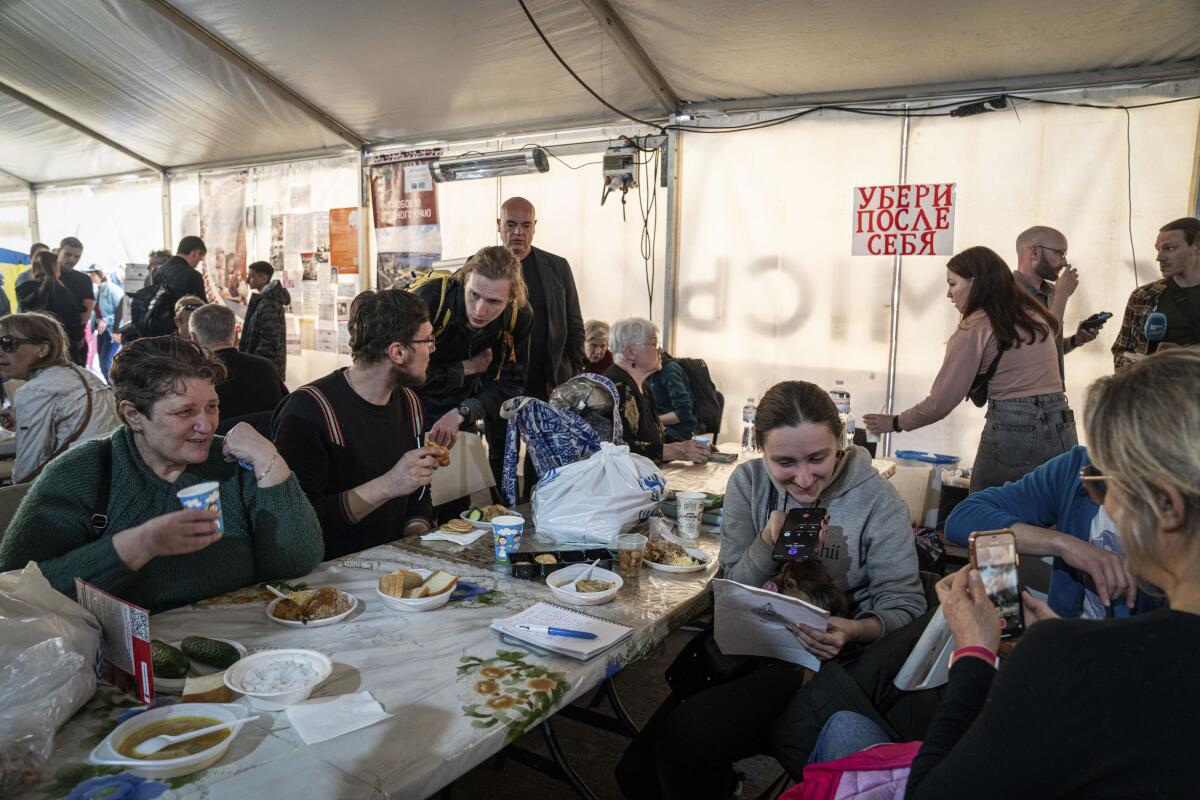
Civilians continued to be evacuated from the besieged southeastern port city of Mariupol on Wednesday with the help of the International Committee of the Red Cross and the United Nations. In his nightly address, President Volodymyr Zelensky said that 344 people had been rescued from the city and its suburbs.
The evacuees are believed to be among the last holdouts living alongside Ukrainian soldiers in desperate conditions at the Azovstal steelworks, which has endured weeks of relentless Russian shelling.
Kuleba, the foreign minister, noted that the resistance at Azovstal still stands in the face of continued attacks.
“Despite all the statements by Russian officials that Mariupol is under their full control, this is not true. Azovstal, the stronghold — the last stronghold of Ukrainian resistance in Mariupol — still holds,” he said.
Russia’s Defense Ministry said that it would open evacuation corridors for civilians at the Azovstal factory from Thursday through Saturday.
Ned Price, a State Department spokesman, told reporters that the U.S. would like to see a prolonged humanitarian corridor rather than Russia cloaking itself “in the guise of an actor with humanitarian concerns ... only to quickly resume shelling and violence.”
Hundreds of people are still trapped at the steel plant, he said, in addition to those in Mariupol.
In another sign of the intensifying campaign in the east, British military intelligence said Russia had deployed 22 battalion tactical groups near the city of Izyum, about 75 miles southeast of the heavily bombarded city of Kharkiv, to stage an attack on the nearby cities of Kramatorsk and Severodonetsk.
Landmark church is a lodestar as Ukrainians mourn war dead and pray for living soldiers: ‘Here, we are all together,’ chaplain says.
“Capturing these cities would consolidate Russian military control of the northeastern Donbas and provide a staging point for their efforts to cut off Ukrainian forces in the region,” the British Defense Ministry said in its daily assessment.
Meanwhile, neighboring Belarus launched military drills Wednesday to test its combat readiness, news reports said. Belarus, an ally of Russia, said the exercises posed no threat to its neighbors or the rest of Europe.
Moscow denied speculation that Russian President Vladimir Putin could use the upcoming Victory Day celebrations Monday — a central national ritual that marks the Soviet Union’s triumph over Nazi Germany in World War II — to announce an expansion of the fighting in Ukraine.
Switching from what the Kremlin has limited itself to calling a “special military operation” to a declaration of war would allow for a greater mobilization of Russian society on behalf of the war effort, including reservists.
On Wednesday, Kremlin spokesman Dmitry Peskov described such rumors as “nonsense.” However, Russia spent weeks denying any intention of invading Ukraine before finally doing so.
Breaking News
Get breaking news, investigations, analysis and more signature journalism from the Los Angeles Times in your inbox.
You may occasionally receive promotional content from the Los Angeles Times.
The proposed embargo on Russian oil would mark the sixth set of EU sanctions imposed on Moscow since the war began. The EU also plans to remove Russian banks — including its largest, Sberbank — from the SWIFT global financial messaging network, ban three Russian broadcasters and sanction high-ranking military officers suspected of war crimes in Bucha, a suburb of Kyiv, and Mariupol.
King reported from Kyiv, Pierson from Singapore and Parvini from Los Angeles. Times staff writers Henry Chu in London and Tracy Wilkinson in Washington contributed to this report.
More to Read
Sign up for Essential California
The most important California stories and recommendations in your inbox every morning.
You may occasionally receive promotional content from the Los Angeles Times.

